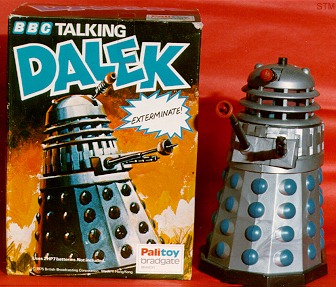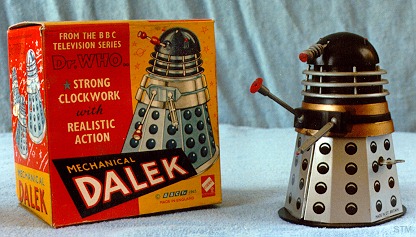I'm making some headway on the next overview update, and I'm doing well enough that it should be ready in the next couple of days! But until then...
Boston is a bit more olde-worlde than Liverpool's industrial-ness though (ironically enough I suppose)...but then it doesn't have to be a perfect analogy to work as a setting.
That's true - though another American city that's similar to Liverpool (and a fair deal more gritty than historic, touristy Boston) is Baltimore.
Thande said:
Well that's slightly creepy, but thanks anyway...

I combed through
everyone who has ever posted to my thread,
including all the one-timers, some of whom even logged in for
months 
It would be good to see this series getting more attention as it was quietly revolutionary - feminist without stuffing it down your throat (ooh-err missus, as Frankie Howard would have said).
That
does fit with the themes of
That Wacky Redhead better, though I'm of the belief that
Star Trek was far more effective when it depicted Sulu and Uhura simply going about their business as valued crew members than so many of those clumsy and awkward (but well-intentioned!) political anvils of the Turd Season IOTL.
I still hoping for a Unit Spinoff. Since Tom Baker is not doing the Doctor, How about casting him as the Human Science Adviser that replaces the Doctor?
I believe I've now been asked to cast Tom Baker in every possible role in
Doctor Who other than that of the Doctor

I recall
[Star Trek, with no further need for clarification] doing it OTL. I suspect what happened is, later screenwriters mistook "cashless" for "no money"...

(Is it me, or do screenwriters have a maximum IQ requirement?


)
I think
The Voyage Home is partly guilty of this IOTL, even though the scene in question could very easily be construed as referring to an EFT system or the like. Then Roddeberry ran with that because it tied into his communal utopian ideas about society, and his "true vision" for
Star Trek.
phx1138 said:
Break the tie on me, if it's not already (& I thought I'd mentioned it...): 1963. I think my tastes skew a bit older, tho.
I'm afraid that's not possible, since you weren't born in one of the four mode years

phx1138 said:
"All in the Family" & "Barney Miller" were both set in NYC.

("Soap", I don't recall.) And don't even bother asking, I liked Kirstie better as Saavik.

So they were, but
Cheers was set in Boston;
sometimes you want to go where everybody knows your name, and they're always glad you came. Also, I believe it's international law that Shelley Long was better than Kirstie Alley, so
I certainly won't dispute that point with you (surprisingly enough). And besides, does
anyone not think that Alley was the best Saavik?

Imagine how much better III could have been if they'd kept her (and I
like III, though obviously not as much as II and IV).
Interesting. It might be fun to have a little "mini"-update detailing the differences between our timeline's Star Trek canon and this timeline's canon. Even within the show itself, there will be some differences (I note that you mentioned in your update on the fifth season that there never was an explicit Klingon-Romulan Alliance in show, like in OTL). In the series, it was also hinted in some episodes that the series took place either way earlier or way later than the 23rd century. When is the crew's five-year mission here? Also important is that, while we're being told we won't get much in the way of more live-action Trek, there will certainly be tie-in material: books, comics, toys, and, when the time comes, video games. Will these be considered canon in this timeline?
I like this suggestion. I
could do a second "legacy" update (there were some details I left out of the first), though it won't be for a little while, because... well, you'll see

With that in mind, I'll only answer one of your questions, because (as with the money issue) I feel that it can be inferred from the canon of the show IOTL: the show takes place
two centuries into the future, not three. The official declaration that
this takes place in the 23rd century did not occur until
The Wrath of Khan, released in 1982; by this time, the space program (which had been moving at breakneck speeds in the 1960s) had slowed to a crawl, and it was clear that we
weren't all going to be living on moon bases by the year 2000. So they "insured" themselves by tacking on an additional century. They won't ITTL, because the space program is much more robust. So the general (though not consistent, obviously) "two centuries from now" custom will hold, and (because writers seem to have no imagination when it comes to dates) the five-year mission will take place in the years 2165-70. Anachronistic references (most notably the one in "The Squire of Gothos") can then be fanwanked away.
vultan said:
Hey, it was fun while it lasted!

And it'll be fun to
write about it, too

vultan said:
My mistake. Still, it is unprecedented for the time, and will certainly be the beginning of a trend.
Yes, but they won't get
too carried away just yet. Remember that these are recessionary times, after all.
It depends what you mean by "Reality TV". Ignoring hidden camera shows, such as Candid Camera, the seventies saw fly-on-the-wall documentaries such as Sailor and The Family (which was based on a US series) in the UK.
Yes,
An American Family, often cited as the
Ur-Reality Show. Butterflied away ITTL (or, at the very least, PBS found a considerably less interesting family to document). I'm defining reality show as we know it today: the fly-on-the-wall, highly choreographed, point-and-laugh genre of television. Talent contests and shows like
Candid Camera are exempt; pioneering examples IOTL would not emerge until the late 1980s with
Cops and
America's Funniest Home Videos.
NCW8 said:
What you want is the episode
Inferno where the Doctor is transported to a parallel universe and meets the "evil" counterparts of the other characters (no goaties, but the Brigadier's counterpart wears an eye-patch). ITTL it would be the last episode before the Yank Years.
That could make for some most
intriguing gap-bridging fanon in both fandoms ITTL

In the vein of the Blish adaptations, yes. Given [since there's only one Star Trek series ITTL, there's no need to describe it as anything else] is more popular TTL, tho, I have to wonder if there will be the blizzard of stuff of OTL. (Brainbin sez "No spin-off series", which says to me, "Less demand" & so "Less merch.")
I never once said no spinoff series. I said no
OTL spinoff series

phx1138 said:
This does mean the OTL flood of novels (so many, by now, every damn day of the 5yr mission has to have been used 3 or 4 times over...


) won't happen. It's likely the comics won't last, if they happen at all. (Offhand, IDK when the first books went to print OTL. They weren't helped by being at one of the smaller presses: Dell or Gold Key, I can't recall.)
It was Gold Key. And to give an OTL counter-example, the
only source of
Futurama canon for
years was the comic book series, which did just fine. And in an era (the 2000s) where comic book purchases were much lower, as far as I know. Even IOTL, the Gold Key line lasted for
twelve years.
phx1138 said:
The action figures (OK, dolls

), toys, & model kits will likely survive, especially the kits, & there's likely to be wider (than OTL) selection of kits IMO, if only because there would be more ships seen TTL. (Personally, I think the profusion of toys & kits is a good thing, & not only for Desilu.

)
And they can have surprisingly long shelf lives. Speaking from experience, there were plenty of early-1980s properties readily available into the 1990s at Toys "R" Us.
phx1138 said:
And That Wacky Redhead(TM) (All rights reserved) will be getting her cut.


That Wacky Redhead is a
very shrewd businesswoman

phx1138 said:
I'm thinking "reality" as accepted today. Documentary series don't count. "Candid Camera" was, AFAIK, aberrant (not quite unique): it made no effort to pretend it was anything but a hidden camera show, so I don't count it, either.
It should also be noted that a lot of talent shows are considered reality series today that were not before their rise IOTL (
American Idol is "reality",
Star Search was not). Indeed, even
American Idol dropped a lot of their early "reality-style" segments (such as all of the contestants living together in a mansion) in later seasons.
I wonder if they used the planned Klingon backstory from Star Trek Phase II in Brainbin's extended version of TOS, which is very different to the Klingon backstory we eventually got. (Basically it had the Klingons as being feudal Japan IIIN SPAAACE with a powerless ceremonial Emperor and a powerful Shogun equivalent, appropriately enough given the Asiatic styling of the TOS Klingons).
Though I did poach from a number of aborted "Phase II" story ideas for the fifth season, "Kitumba" was not one of them. The Klingons were too established to introduce radical backstory changes in the midst of a continuing series. That story would have been much easier to sell in the context of a revival series, which indeed it was IOTL.
They are NOT dolls, they
are ACTION FIGURES!!!


You keep telling yourself that

PS - Think you have it already Brainbin but my date is 1959.
I do indeed have it already, but thanks for sharing anyway, Steve




